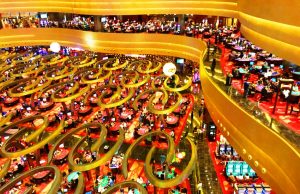
Singapore, a global economic hub in Southeast Asia, has strategically embraced the gambling industry while implementing robust measures to ensure responsible gaming and address potential social concerns. In this article, we delve into the comprehensive strategies that Singapore employs to manage its gambling business, examining regulatory frameworks, social safeguards, and economic considerations.
1. Integrated Resort Model:
a. Two Integrated Resorts (IRs): Singapore’s approach to gambling centers around two integrated resorts—Marina Bay Sands and Resorts World Sentosa. These resorts offer a diverse range of attractions, including casinos, hotels, entertainment venues, shopping, and dining options.
b. Diversifying Revenue Streams: By integrating entertainment, shopping, and dining alongside casinos, Singapore’s integrated resort model aims to diversify revenue streams and mitigate the potential negative impacts associated with a sole focus on gambling.
2. Strict Regulatory Framework:
a. Casino Control Act: Singapore has enacted the Casino Control Act, which serves as the regulatory framework governing casino operations. The act outlines stringent regulations related to licensing, operation, and social safeguards.
b. Social Safeguards: The regulatory framework emphasizes social safeguards to address potential issues related to problem gambling. Measures include entry restrictions, self-exclusion programs, and casino exclusion orders to manage and mitigate the impact on vulnerable individuals.
3. Entry Restrictions and Fees:
a. Minimum Age and Entry Fees: To regulate access to casinos, Singapore imposes a minimum age requirement of 21 for patrons. Additionally, locals and permanent residents are required to pay an entry fee or buy an annual membership to deter casual and impulsive visits.
b. Addressing Problem Gambling: The entry restrictions and fees contribute to responsible gaming by discouraging excessive gambling and providing an additional layer of scrutiny to identify potential problem gamblers.
4. Social Safeguards and Responsible Gaming:
a. Self-Exclusion Programs: Singapore offers self-exclusion programs, allowing individuals to voluntarily exclude themselves from casino entry. This empowers individuals to take control of their gambling habits and seek assistance if needed.
b. Casino Exclusion Orders: Family members concerned about a loved one’s gambling behavior can apply for casino exclusion orders. These orders prevent individuals from entering casinos and provide a supportive mechanism for families dealing with gambling-related issues.
5. Community Engagement and Education:
a. Public Awareness Campaigns: Singapore actively engages in public awareness campaigns to educate the community about responsible gaming practices and potential risks associated with gambling. These campaigns aim to foster informed decision-making among the public.
b. Collaboration with NGOs: The government collaborates with non-governmental organizations (NGOs) and counseling services to provide support and assistance to individuals facing gambling-related challenges.
6. Economic Contribution and Tourism:
a. Job Creation: The gambling industry in Singapore contributes significantly to job creation, with integrated resorts serving as major employers. The economic benefits extend beyond the resorts themselves to include various ancillary services.
b. Tourism Boost: Integrated resorts are key components of Singapore’s tourism strategy. They attract international visitors, conferences, and events, contributing to the overall growth of the tourism sector and the country’s economy.
7. Regulatory Adaptability and Innovation:
a. Periodic Reviews: Singapore periodically reviews its regulatory framework to ensure its effectiveness in addressing emerging challenges and maintaining alignment with global best practices.
b. Adopting New Technologies: The government remains open to embracing technological innovations in the gambling industry, such as online betting platforms, while ensuring that they are regulated to prevent abuse and maintain responsible gaming standards.
8. Maintaining a Competitive Edge:
a. Global Gaming Landscape: Singapore’s approach to managing its gambling business involves staying attuned to the global gaming landscape. By continually assessing trends, regulations, and innovations, Singapore positions itself as a competitive player in the international gambling industry.
b. Adapting to Market Dynamics: The country’s ability to adapt to changing market dynamics and consumer preferences ensures that its gambling business remains dynamic, resilient, and aligned with broader economic goals.
Conclusion:
Singapore’s management of its gambling business represents a carefully calibrated balancing act, leveraging economic opportunities while prioritizing social safeguards and responsible gaming. The integrated resort model, strict regulatory frameworks, entry restrictions, and social safeguards collectively contribute to a comprehensive approach that addresses the potential pitfalls associated with the gambling industry. By actively engaging the community, adopting innovative technologies, and maintaining adaptability in a rapidly evolving global landscape, Singapore demonstrates its commitment to fostering a responsible and sustainable gambling environment.